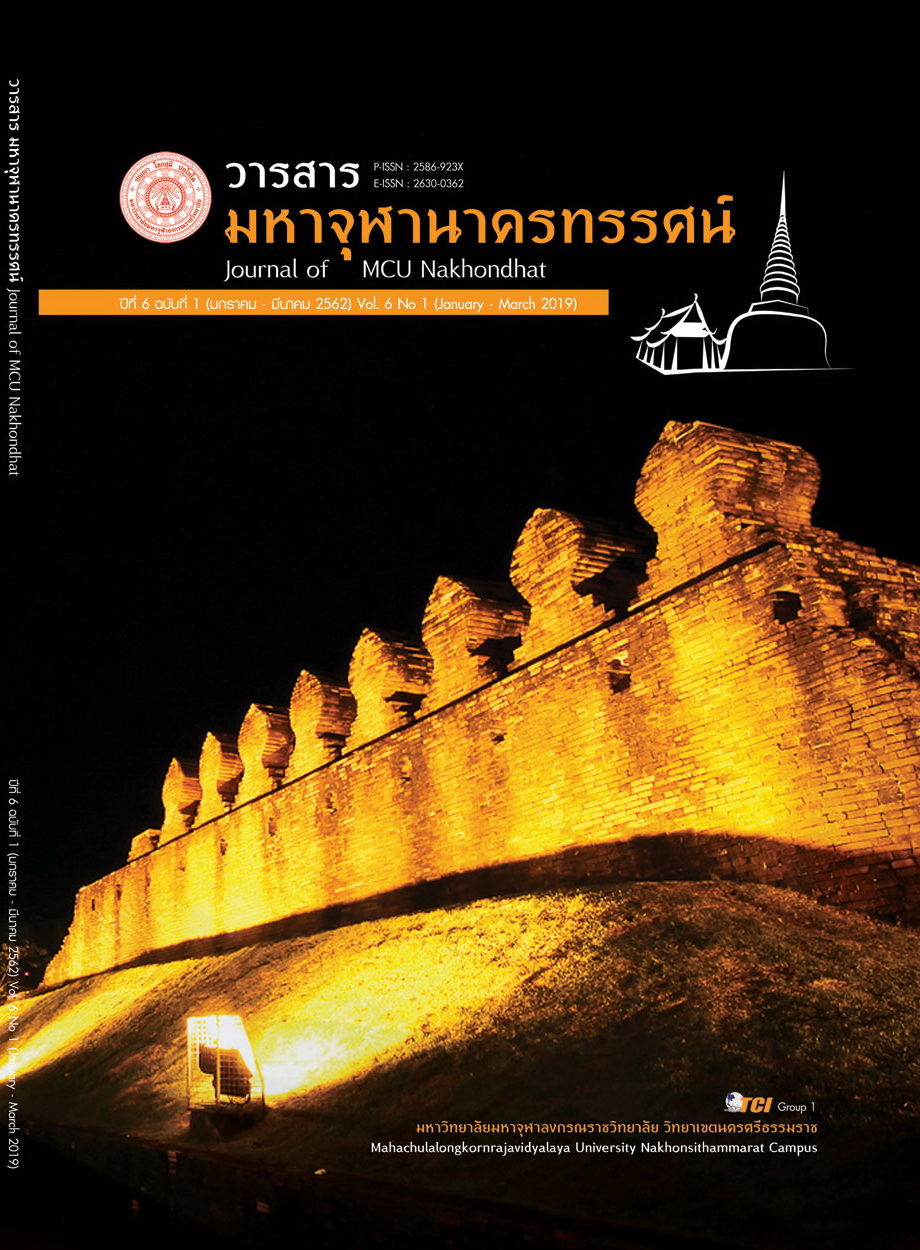USING BUDDHIST GUIDANCE ACTIVITIES TO PROMOTE LIFE SKILLS ON LEARNING TIMING AND RELATIONSHIP OF SECONDARY SCHOOL STUDENTS IN BANGKOK AND PERIMETER.
Main Article Content
Abstract
This research has named Using Buddhist Guidance Activities to Promote Life Skills on Learning Timing and Relationship of Secondary School Students in Bangkok and Perimeter. Its objectives were 1) to study the concept and principles of this title, 2) to develop the principles in using the Buddhist guidance activities and 3) to study the outcome in using these activities. The research performance was the quasi experimental research by using model as the pre-participation and post participation into the activities. The sampling has the number of 300 persons and the data collection was the questionnaires provided into 2 types. There were 1) the package of guidance activities and 2) the questionnaires measured the Buddhist guidance activities to promote the students’ life skills and relationship about the learning and timing. The data was analyzed from the questionnaires of them in pre-participation and post participation with the guidance activities. The statistic value was used as the frequency, percentage, means, standard deviation and one way analysis of variance.
The research found that;
- The students in Bangkok and around its area pre-participate in the guidance activities. In the overview, it was at the middle level. When it was contemplated in a point, it was found that before the students participated into three kinds of the guidance activities as learning and timing activities. Its level was at high. After the students participated into the guidance activities, it was at the highest level in the overview. When each issue was considered, it was found that after participation into the guidance activities of the students, the three kinds of the guidance activities were at the highest level by setting the orders from the high level to the low level respectively.
- These students have the life skills in the learning, timing and interpersonal relationship and their skills were not different in pre-participating into the guidance activities although they have the different sex. After they had participated into the guidance activities, their skills were the significant difference at 0.05 as the written hypothesis. Moreover, when providing along with the different age, parents’ and economic status, the students pre-participated and post participated into the guidance activities on the life skills, learning, timing and interpersonal relationship, its finding was not different so the written synthesis was refused.
- The problems, obstructions and the suggestions on this title appeared in this research. The students should train themselves to speaking in the classroom when they had opportunity to speak and accept the complaint, admiration and always develop themselves. When they had the problems and felt sad in learning, they should go to visit and take the consult of the teachers, parents on the learning time and living in their daily life.
Article Details
References
กาญจนา เฉลิมพล. (2555). การศึกษารูปแบบเป้าหมายทักษะชีวิตของนักเรียนชั้นมัธยมศึกษาตอนต้นโรงเรียนราชโบริกานุเคราะห์ จังหวัดราชบุรี. ปริญญาการศึกษามหาบัณฑิต สาขาวิชาจิตวิทยาการแนะแนว: มหาวิทยาลัยศรีนครินทรวิโรฒ.
ขนิษฐา เสาองค์. (2557). วิจัยเรื่อง การใช้ชุดกิจกรรมแนะแนวเพื่อพัฒนาทักษะด้านการศึกษา อาชีพ ชีวิตและสังคมของนักเรียนชั้นมัธยมศึกษาปีที่ 2.
ชุติมา ศิริรักษ์. (2559). ชุดกิจกรรมแนะแนวเพื่อพัฒนาทักษะชีวิตของนักเรียนมัธยมศึกษาปีที่ 4. มัธยมศึกษา เขต 15, ยะลา: สำนักงานเขตพื้นที่.
ชูชีพ อ่อนโคกสูง และอนุสรณ์ อรรถศิริ. (2549). ความสัมพันธ์ระหว่างพลังความสามารถแห่งตนเป้าหมาย และความเป็นไปได้ที่จะกระทำกับแรงจูงใจในการเรียน. กรุงเทพมหานคร: มหาวิทยาลัยศรีนครินทรวิโรฒ.
ละอองทิพย์ พลานุภาพ. ( 2532.). สุขภาพจิตกับการให้เหตุผลเชิงจริยธรรมของเด็กที่อยู่ในสภาพแวดล้อมต่างกัน. กรุงเทพมหานคร: บัณฑิตวิทยาลัย มหาวิทยาลัยศรีนครินททร์วิโรฒ.
สำนักงานคณะกรรมการการศึกษาขั้นพื้นฐาน. (25 กรกฎาคม 2560). กลุ่มสารสนเทศ สนผ ระบบสารสนเทศเพื่อบริหารการศึกษา.


